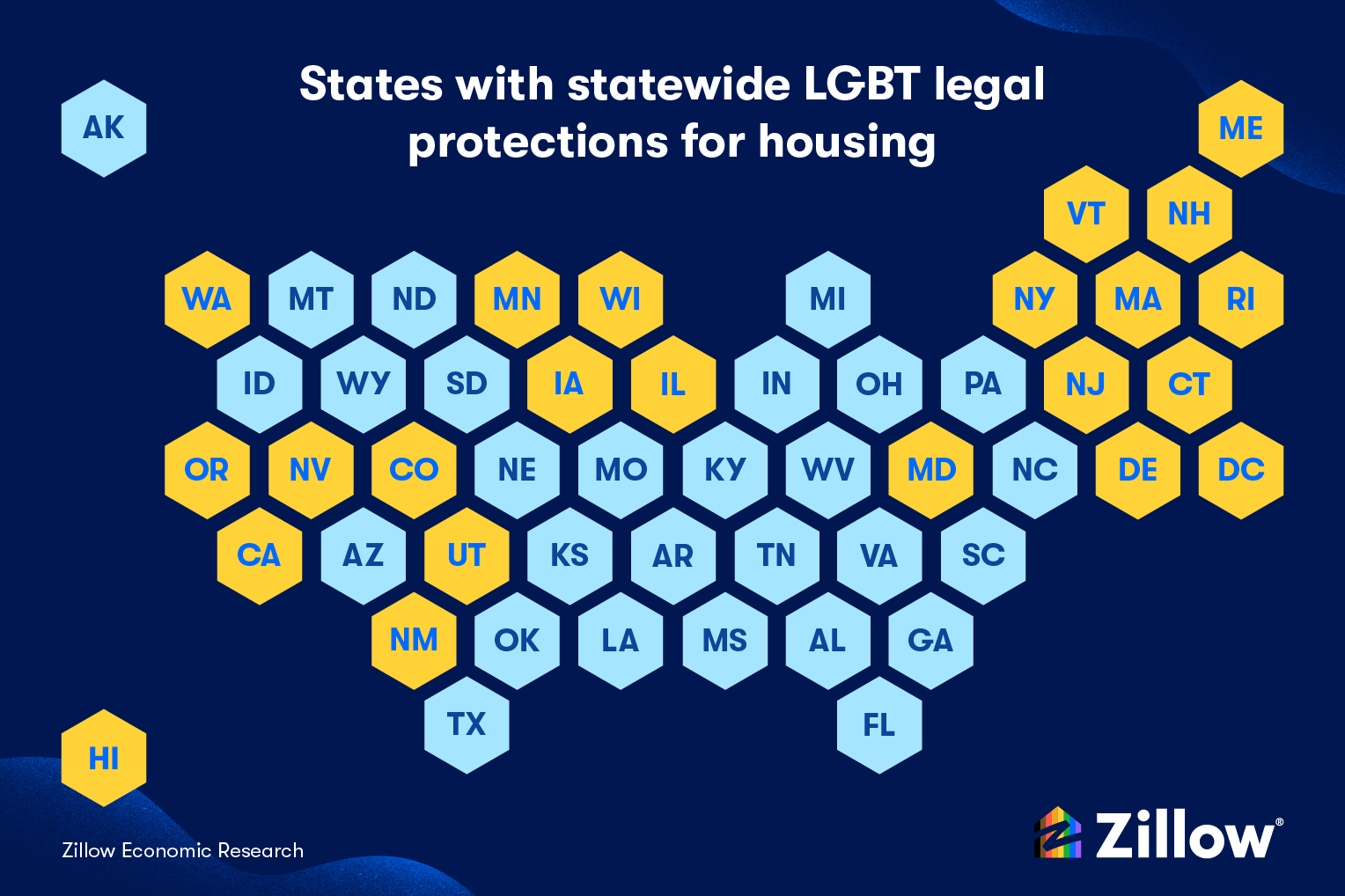It’s a story that’s been repeated for decades: A young LGBTQ+ person struggles in small-town America, moves to a big city where they come out and are welcomed into a community that encourages them to be their authentic self. Moves like this are often the result of government policy: Cities tend to have more fair housing laws than suburban or rural areas to protect LGBTQ+ people from discrimination.
The story can have a happy ending, but at a cost: According to Zillow research, areas that offer laws against discrimination in housing come with a higher price tag, meaning LGBTQ+ buyers who can’t afford to live in those places must forego the protections.
Nick Libert has lived this story. He’s a Zillow Premier Agent and owns and runs EXIT Strategy Realty, a brokerage in Chicago. Libert grew up and went to college in northern Indiana. On a regular basis, he and his fraternity brothers would drive to Chicago to see the Cubs at Wrigley Field. Nick would sometimes sneak off to the nearby gay neighborhood called Boystown.
“I would say ‘wow, this is great! I love the energy, I love that I can be me,’” Libert says. “And I gotta tell you, I would go back to Indiana and it was really depressing to know that this was over here and I couldn’t afford to be here yet.” Libert made it his mission to get back to Chicago after college as quickly as possible.
Zillow believes everyone deserves a safe, affordable home, free of discrimination. Federal law does not provide those protections. That’s why Zillow is shining a spotlight on towns and cities that have LGBTQ+ protections, and those that don’t. Information on LGBTQ+ housing, employment and public accommodation laws is now available on all Zillow home listings across the nation.

“In many parts of the United States, you still can be discriminated against for being LGBTQ+,” says Kristina Adamski, Zillow’s vice president of corporate relations. “We are committed to giving people the most information possible when buying, renting and financing a home. Putting this information in every single listing shows we stand for equity and fair housing, and gives LGBTQ+ people critical information they need to make a decision on where to live.”
The information is aggregated and provided by the LGBTQ+ think tank Movement Advancement Project and is also available on local and state government websites. Libert says “to have it come from a trusted source like Zillow is important.”
Making transparency happen
Work to add LGBT legal protections into listings began as a grassroots effort by members of the Zillow LGBTQ+ Pride affinity network. The information was first available in 2018 on Trulia, which was acquired by Zillow in 2015. Jake Piccini, then a Zillow technology intern in Lincoln, Neb., watched the launch.
“I was blown away because I didn’t really know how much LGBTQ+ pride there was at Zillow.” As a gay man who grew up and attended college in Nebraska, which has no LGBTQ+ legal protections, Piccini says he wanted to take the project further.
So the next summer, while an intern in Seattle, Piccini pitched a Hack Week project to show how the content could be built into the Zillow platform. LGBTQ+ colleagues and allies at Zillow volunteered to help him. “The fact that you don’t have to be in the community to be involved in it shows you how amazing the culture is at Zillow.”
Piccini recently graduated from the University of Nebraska at Lincoln. Last week he joined Zillow full-time, a company where he says he doesn’t have to “compromise my morals.” Piccini says the LGBT+ legal protections work “ranks pretty high up there in terms of personal fulfillment and the kind of impact I can have on the world.”
Fair housing futures
The Zillow rentals product team implemented Piccini’s concept and is already thinking of how to take the effort further. “This definitely won’t end here,” says Doug Pope, Zillow vice president of rentals product. “There are other communities discriminated against in the U.S. and our hope is that we can expand our efforts to shine a light on the presence — or absence — of fair housing laws that impact those communities.”
Zillow is a strong supporter of the Equality Act, a proposed federal bill that would provide housing protection to LGBTQ people. The bill was passed by the House of Representatives and is awaiting action in the Senate.
Libert is happy the U.S. Supreme Court last year ruled that federal civil right law protects gay, lesbian and transgender workers from employment discrimination. “It may not be tomorrow, but I think someday, there will be equal protections for everyone,” he says. “And I hope those protections will be everywhere, so you don’t have to go to a big city to get them.”
Related:
Zillow’s Pride network on the crucial need for active allyship
PFLAG tips on how to be an ally
The new grammar: Pronoun training at Zillow